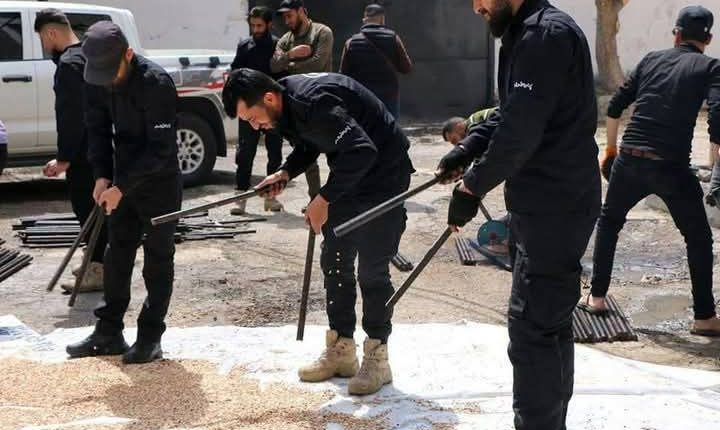Massive Captagon Haul Seized by Syrian Security Forces at Latakia Port
By Kardo Roj
LATAKIA, Syria (North Press) – Internal Security Forces in the coastal city of Latakia announced Saturday the seizure of a significant shipment of narcotics, uncovering approximately four million Captagon pills hidden in storage facilities at the Latakia Port, in what authorities say was a foiled smuggling attempt to Egypt.
According to Khaled al-Naas, head of the Executive Force in the Narcotics Control Branch in Latakia, the operation was carried out following precise intelligence indicating the presence of concealed narcotics within the port’s warehouses. Al-Naas revealed to North Press that the confiscated warehouses were reportedly under the control of remnants of the former regime’s notorious 4th Division, once commanded by Maher al-Assad.
“These facilities were systematically used for the manufacturing and trafficking of Captagon,” said al-Naas, describing the operation as part of a broader security campaign to dismantle drug networks that continue to destabilize the region.
The seizure adds to growing evidence of Syria’s complex entanglement in the regional narcotics trade, particularly the production and export of Captagon—a synthetic stimulant that has become one of the Middle East’s most pervasive illicit drugs.
International watchdogs and UN agencies have repeatedly warned of the alarming expansion of drug networks operating within and from Syria, exacerbating cross-border instability. While the Captagon industry has been widely associated with state-linked actors in the past, the current transitional government has sought to distance itself from those legacy structures and is increasingly cooperating with internal and regional security bodies.
The narcotics were discovered meticulously concealed in metallic pipes, indicating a high degree of planning and professional smuggling methods. In addition to the pills, authorities also seized manufacturing equipment, including tablet presses and raw materials, which were transferred to specialized teams for destruction.
This latest operation in Latakia, though far from the territories administered by the Autonomous Administration of North and East Syria (AANES), comes amid heightened national and regional attention on narcotics control. The success of such operations, carried out by evolving security institutions, reflects broader efforts by Syria’s interim structures to restore rule of law and confront transnational threats.
While northeast Syria under AANES has implemented strict measures against drug production and trafficking—often in coordination with international partners—the wider Syrian landscape continues to battle remnants of the former regime’s illicit infrastructure, including smuggling routes and production hubs that have thrived in the absence of centralized oversight.
The interception of a drug shipment of this scale has significant regional implications, particularly as neighboring countries—such as Jordan, Lebanon, and Iraq—struggle to contain the spillover of Syria-origin narcotics. Egypt, the reported destination of this haul, has also intensified port inspections and border security in response to increased trafficking attempts.
Security officials have reiterated that this operation is part of a series of ongoing investigations, with further raids expected in coordination with regional partners. As Syria’s new governing structures attempt to rebuild legitimacy and restore order, the dismantling of legacy drug networks is emerging as a central challenge.

